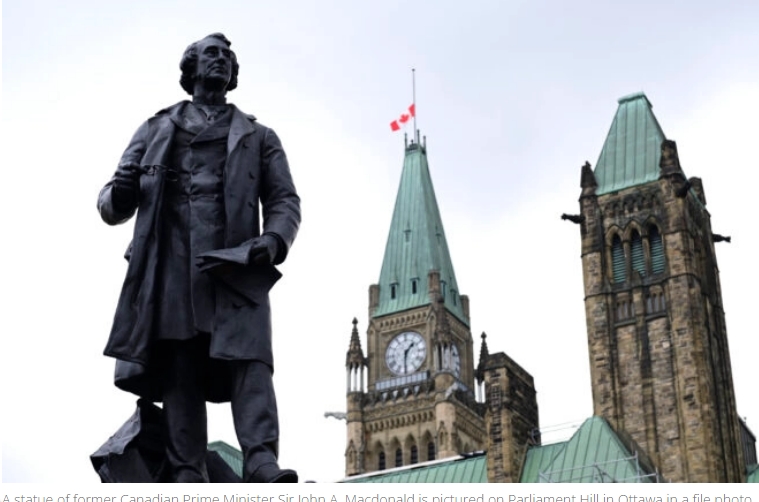By Conrad Black
July 1 has come again and naturally raises thoughts, however cursorily, of what Canada has been in the 157 years since Confederation was launched on July 1 of 1867, as well as of what it might become.
It was in these circumstances, and somewhat for these reasons, that Canada was born as a confederation. The leaders of the different Canadian provinces, and in particular the currently much-defamed John A. Macdonald, seized upon the American threat, domestically and in relations with Great Britain, to proclaim that only the creation of an autonomous country would have any chance of preserving British interests in the Americas and of defusing substantially justified American annoyance with Great Britain. On July 1, 1867, the defence minister, George-Étienne Cartier, had mobilized 50,000 soldiers and militiamen and stationed them at all border points to discourage attacks by Irish-American Fenians trying to start a war. Canada would not easily muster such a force today.

To bind the country together—since it was then a string of communities close by the American border that were not united by any particular shared interest, but just did not happen to be American—Macdonald promised a transcontinental railway. This would be one of the engineering and financial wonders of the world as, unlike American railways to the West Coast, much of it had to be run over the Canadian Shield, and not simply the great plains, requiring a road bed fixed into stone. In addition, it could not be financed in Canada’s modest capital markets, or those of London and New York, which were crowded with the securities of American competitors to the new railroad.
These were the beginnings of the Confederation that we celebrate each July 1.
We can say on this anniversary, as on many previous ones, that Canada is a relatively pleasant place to live. Despite economic mismanagement and steady slippage in our comparative standing in per capita income, Canada remains one of the world’s rich countries. Such a treasure house as Canada is—generously endowed with precious and br metals, forest products, agriculture of all kinds except some tropical fruit, energy of every type—would take an even more determined effort at colossal economic incompetence than we have been making for the last several years to dump us altogether out of our position as one of the world’s rich countries.
It is also undoubtedly a comparatively high-tolerance and low-violence country. Perhaps because it has always been understood that Canada needed more people to populate such a vast territory, and to have a critical demographic mass adequate to avoid being completely overawed by the United States, Canadians have always been comparatively generous to newcomers.
We are now, and have been for 75 years, a constitutional monarchy with a non-resident sovereign. Our Constitution has not been ratified by Quebec, and over time, the notion of a non-residential monarchy is problematic. Because it is difficult to distinguish an English-speaking Canadian from an American living close to his northern border, and because of cultural and economic and political influences of the United States in Canada, this country has always been unduly preoccupied with explaining, to itself, its existence as a society politically distinct from that of the USA.
These post-Cold War decades have been difficult for the Americans, and after America’s overwhelming victory in the Cold War, it has been much less intimidatingly successful. Few Canadians are over-impressed with the United States now, though we wish it well, and this is the time when a good government, such as we have often had in Canada from both major parties, could build on this country’s strengths and allow its individuality, which is generally obscured by national diffidence and taciturnity, to come to the fore.
This July 1 we can again celebrate one of the world’s best countries, and one that could and should be on the verge of becoming one of its greatest countries. It is time to pull it together—to bury the spectre of Quebec separatism and bring Quebec into the Constitution. And it is time to stop being a ludicrous and exhibitionistic outlier in political correctness and wokeness.
Let Canada be Canada, and it will impress the world and astound ourselves.
First published in the Epoch Times
- Like
- Digg
- Del
- Tumblr
- VKontakte
- Buffer
- Love This
- Odnoklassniki
- Meneame
- Blogger
- Amazon
- Yahoo Mail
- Gmail
- AOL
- Newsvine
- HackerNews
- Evernote
- MySpace
- Mail.ru
- Viadeo
- Line
- Comments
- Yummly
- SMS
- Viber
- Telegram
- Subscribe
- Skype
- Facebook Messenger
- Kakao
- LiveJournal
- Yammer
- Edgar
- Fintel
- Mix
- Instapaper
- Copy Link







One Response
So what creed defines, describes, characterises, differentiates the Canadian today? What would that Canadian live and die for and ally itself with; what codes of morality to guide its daily life decisions?
Where different re GB and USA?